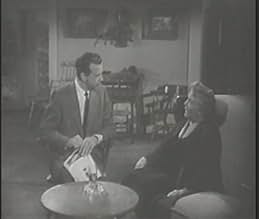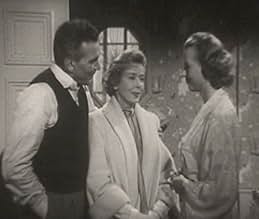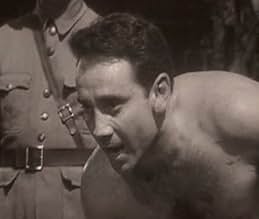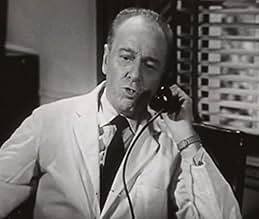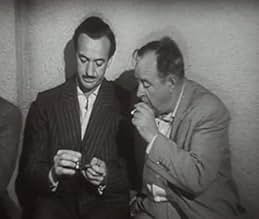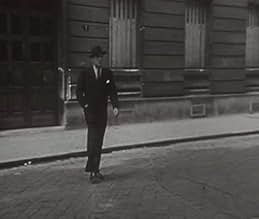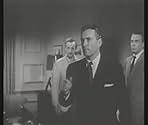Füge eine Handlung in deiner Sprache hinzuThis show featured four rotating stars, Charles Boyer, David Niven, Ida Lupino, and Dick Powell in individual episodes consisting of everything from comedy to drama.This show featured four rotating stars, Charles Boyer, David Niven, Ida Lupino, and Dick Powell in individual episodes consisting of everything from comedy to drama.This show featured four rotating stars, Charles Boyer, David Niven, Ida Lupino, and Dick Powell in individual episodes consisting of everything from comedy to drama.
- Für 14 Primetime Emmys nominiert
- 2 Gewinne & 16 Nominierungen insgesamt
Folgen durchsuchen
Empfohlene Bewertungen
"Four Star Playhouse" was regularly viewed and enjoyed in my home during the 1950s, at which time half-hour anthology series were in vogue. The long-time winner in the ratings race was Frank Wisbar's "Fireside Theatre" on NBC, skillfully produced and directed, with the emphasis on often suspenseful stories, well-cast with noted players who, for the most part, were not accustomed to seeing their names above a film's title to attract patrons to theaters. Dick Powell and his associates set about to produce a different sort of series, with the focus on rotating star players - their names, on the small screen, indeed appearing before the title of each half-hour play. All four stars had attracted fans to the box office over the years. We tuned in weekly to see Mr. Powell, Charles Boyer, David Niven, and often Ida Lupino in a variety of roles, ranging from melodrama to mild comedy. The shows were uniformly excellent.
After "Four Star Playhouse," several anthology series were built around star players, although this program initiated the pattern of using rotating leads. The show's dramatic entries have held up extremely well over the years, and considerably better than the whimsical stories and light comedies. Syndicated under the title "Star Performance," the series has enjoyed a long life on the small screen, and the majority of the episodes may be found in circulation today for home video or online enjoyment. In the late 1950s, Official Films syndicated a package of 153 episodes of "Star Performance," and only a small number are inaccessible today. Mr. Boyer, Ms. Lupino, Mr. Niven, and Mr. Powell were excellent actors - and, although each specialized in a certain type of role, the series permitted all four to occasionally step into less familiar territory, to display versatility. Each of us has favorites from the anthology, but the series as a whole was produced for the purpose of entertaining an audience - and the fact that we continue to enjoy the programs some seventy years after they were filmed is a tribute to those who created, produced, wrote and performed in them.
After "Four Star Playhouse," several anthology series were built around star players, although this program initiated the pattern of using rotating leads. The show's dramatic entries have held up extremely well over the years, and considerably better than the whimsical stories and light comedies. Syndicated under the title "Star Performance," the series has enjoyed a long life on the small screen, and the majority of the episodes may be found in circulation today for home video or online enjoyment. In the late 1950s, Official Films syndicated a package of 153 episodes of "Star Performance," and only a small number are inaccessible today. Mr. Boyer, Ms. Lupino, Mr. Niven, and Mr. Powell were excellent actors - and, although each specialized in a certain type of role, the series permitted all four to occasionally step into less familiar territory, to display versatility. Each of us has favorites from the anthology, but the series as a whole was produced for the purpose of entertaining an audience - and the fact that we continue to enjoy the programs some seventy years after they were filmed is a tribute to those who created, produced, wrote and performed in them.
Although Ida Lupino was not that interesting to look at, her themes of loneliness and singleness made a valuable contribution to later projects such as 'The Twilight Zone' and 'Thriller'. I can't say that I enjoyed this particular project, or any of her projects leading up to 1959. She was probably a better writer than actress.
Various seasons packaged in various ways. Some presentations are of only one 30-minute play. You will have to read closely to not have too many duplicates. The same may be on DVR but others are on real DVD.
Actors include: Dick Powell, David Niven, Charles Boyer, Ida Lupino And may more of your old-time favorites
Black and white 4:3 and did not find a digitally corrected version.
Do not count on subtitles either.
The programs are 30 minutes. Hardly enough time to set up the suspense put in a twist and come to a conclusion.
I started with Dick Powel "A Study in Panic" (Season 2 - Episode 28) with Dorothy Malone (1924-2018).
"Let the Chips Fall" (Season 4 - Episode 3) " Charles Boyer (1899-1978)
"The girl on the Park Bench" (Season 2 - Episode 11) Joan Fontaine (I) (1917-2013)
I only watched a hand full of episodes. However, these are worth holding a place in your library.
Actors include: Dick Powell, David Niven, Charles Boyer, Ida Lupino And may more of your old-time favorites
Black and white 4:3 and did not find a digitally corrected version.
Do not count on subtitles either.
The programs are 30 minutes. Hardly enough time to set up the suspense put in a twist and come to a conclusion.
I started with Dick Powel "A Study in Panic" (Season 2 - Episode 28) with Dorothy Malone (1924-2018).
"Let the Chips Fall" (Season 4 - Episode 3) " Charles Boyer (1899-1978)
"The girl on the Park Bench" (Season 2 - Episode 11) Joan Fontaine (I) (1917-2013)
I only watched a hand full of episodes. However, these are worth holding a place in your library.
I remember several episodes of Four Star Playhouse from 1953-54. Ida Lupino was in one of them called "The green Dress" or something like that. It scared the blazes out of me. In it, Ida Lupino starred as a housewife murdered by her husband. She was pushed down a flight of stairs and broke her neck. Later, she returned to haunt him as an apparition at the top of the stairs, wearing the same green dress that she died in. I was five or six years old at the time of viewing this. Guess you could say it stuck in my mind! The other episode was the story of a woman who was being exploited by relatives for money. They were attempting to drive her mad or cause her suicide. The story unfolds as this young woman is looking for a new place to live. Her calculating uncle and aunt show her a renovated apartment that they know of. She is shown in, and while she is distracted, the sinister couple slips out and locks the door. Eventually this young woman becomes quite desperate as all the doors and windows are locked,the phone is disconnected, and nobody can hear her banging on the door. One scene shows her opening a closet door only to be greeted by the site of a hanging rope noose. She gets revenge by tricking her adversaries inside and locking the door on them.
I was too young at the time to be a movie critic. In retrospect however, I think these were classics that shouldn't be missed by those who love unique,unsettling dramas.
I was too young at the time to be a movie critic. In retrospect however, I think these were classics that shouldn't be missed by those who love unique,unsettling dramas.
According to the Tony Thomas book on The Films Of Dick Powell although the company was named Four Star Productions only three stars ever invested on the producing end, David Niven, Charles Boyer, and Dick Powell. They never came up with a fourth though Ida Lupino kept them dangling for a while.
Niven and Boyer were glad to let Powell run the business end of Four Star Productions. Powell himself eagerly embraced the new small screen medium of television, it was his firm belief that like Madonna you had to reinvent yourself periodically or become a has been in the entertainment business. So he went from crooning tenor in musicals to tough guy leading man to big time TV producer. Four Star Playhouse was one of many anthology series in those early television days of the Fifties and a source of good drama.
Not to mention it was the first of many television series that Four Star Productions created. You'll find a lot of familiar names in the credits of Four Star Playhouse in front of and behind the camera. Powell had a good eye for spotting talent and gave a boost to a lot of careers.
When Dick Powell died in early 1963 he was quite the tycoon, creating many shows under the Four Star banner. He even acted in several stories in Four Star and the Zane Grey Theater.
Several Four Star shows have been put on YouTube and I urge you strongly to see them.
Niven and Boyer were glad to let Powell run the business end of Four Star Productions. Powell himself eagerly embraced the new small screen medium of television, it was his firm belief that like Madonna you had to reinvent yourself periodically or become a has been in the entertainment business. So he went from crooning tenor in musicals to tough guy leading man to big time TV producer. Four Star Playhouse was one of many anthology series in those early television days of the Fifties and a source of good drama.
Not to mention it was the first of many television series that Four Star Productions created. You'll find a lot of familiar names in the credits of Four Star Playhouse in front of and behind the camera. Powell had a good eye for spotting talent and gave a boost to a lot of careers.
When Dick Powell died in early 1963 he was quite the tycoon, creating many shows under the Four Star banner. He even acted in several stories in Four Star and the Zane Grey Theater.
Several Four Star shows have been put on YouTube and I urge you strongly to see them.
Wusstest du schon
- WissenswertesThe original four stars who were to appear in this show were Charles Boyer, Joel McCrea, Dick Powell, and Rosalind Russell. McCrea and Russell pulled out soon after the company was formed, and were replaced by Ida Lupino and David Niven.
- Crazy CreditsIn episode 1.2, "Dante's Inferno," the character played by Regis Toomey is listed as "Lt. Wald," even though he is referred to in dialog several times as "Lt. Waldo." The role of Herb Vigran is identified there as "Monty Leeds," but in all subsequent episodes set in the titular nightclub the name is given as "Monte [no surname]."
- Alternative VersionenThe syndicated rerun version of the episode "The House Always Wins" (4/28/1955), also used for at least one video release, is missing Jack Benny's cameo appearance.
- VerbindungenFeatured in Biography: Angela Lansbury: A Balancing Act (1998)
Top-Auswahl
Melde dich zum Bewerten an und greife auf die Watchlist für personalisierte Empfehlungen zu.
Details
- Erscheinungsdatum
- Herkunftsland
- Sprache
- Auch bekannt als
- Charles Boyer Stars
- Drehorte
- Produktionsfirma
- Weitere beteiligte Unternehmen bei IMDbPro anzeigen
- Laufzeit30 Minuten
- Farbe
- Seitenverhältnis
- 1.33 : 1
Zu dieser Seite beitragen
Bearbeitung vorschlagen oder fehlenden Inhalt hinzufügen

Oberste Lücke
By what name was Four Star Playhouse (1952) officially released in India in English?
Antwort
